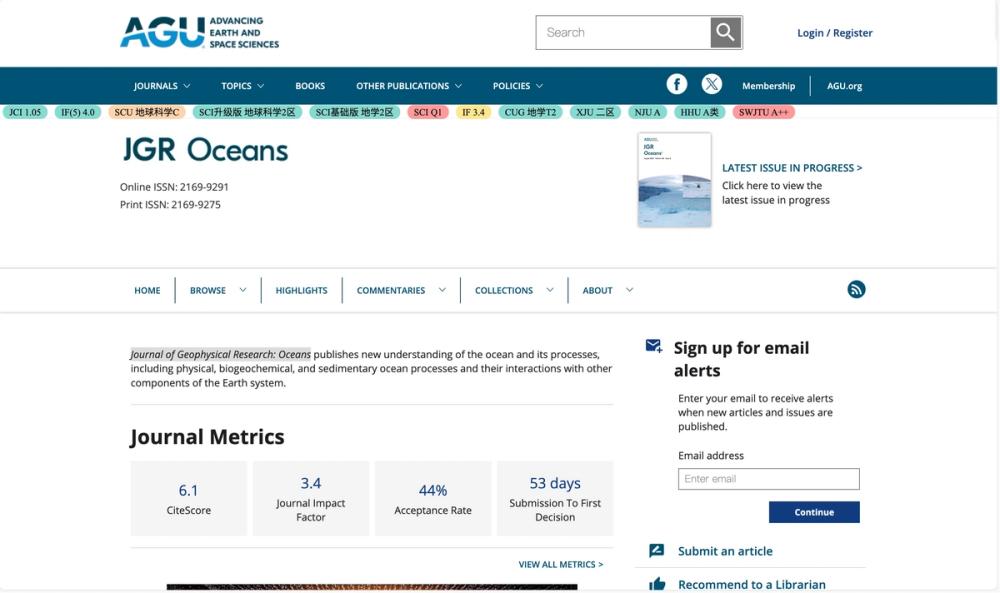Name: Journal of Geophysical Research: Oceans
Link: agupubs.onlinelibrary.wiley.com/journal/21699291
Description: Journal of Geophysical Research: Oceans is a premier peer-reviewed journal publishing original research on ocean physics, chemistry, biology, and geology, and their interactions with the Earth system.
Key Words: oceanography, peer-reviewed, physical oceanography, biogeochemistry, marine geology, Earth system interactions, original research
Introduction to Journal of Geophysical Research: Oceans
The Journal of Geophysical Research: Oceans (JGR: Oceans), published by the American Geophysical Union (AGU), is a leading scientific journal dedicated to advancing the understanding of the ocean and its processes. Established as a specialized section of the broader Journal of Geophysical Research in 1980, JGR: Oceans focuses on original research articles that explore the physics, chemistry, biology, and geology of the oceans, as well as their interactions with other components of the Earth system, such as the atmosphere, cryosphere, and terrestrial environments.
JGR: Oceans is renowned for its rigorous peer-review process, ensuring high-quality, impactful research that contributes to the global body of oceanographic knowledge. The journal publishes studies that employ advanced observational, analytical, computational, and modeling techniques to deepen insights into marine science. Topics covered include ocean circulation, water masses, sea level changes, air-sea interactions, climate change impacts, nearshore processes, ocean mixing, biogeochemical cycles, and sediment transport, among others.
The journal encourages submissions that provide novel contributions to aquatic ecology, geophysics, geosciences, and oceanography, with an emphasis on originality and practical impact. It is indexed in major databases like Scopus, Web of Science, and PubMed, and has a strong reputation, with a 2010 impact factor of 3.303, ranking it 15th out of 165 journals in the "Geosciences, Multidisciplinary" category. JGR: Oceans is particularly noted for its high citation rates, reflecting its influence in the field.
Authors submitting to JGR: Oceans must adhere to strict guidelines, including a word limit of 25 publication units (approximately 12,500 words, excluding references and captions) and a structured abstract of up to 250 words. The journal supports open science by encouraging the use of International Geo Sample Numbers (IGSNs) for sample identification and linking datasets to repositories. It also promotes accessibility through policies like providing alt-text for figures and supporting colorblind-friendly visuals. Manuscripts are submitted via the GEMS platform (https://jgr-oceans-submit.agu.org), and authors are encouraged to include ORCID identifiers to link their work.
JGR: Oceans embraces interdisciplinary research, fostering contributions that integrate multiple Earth system components. Recent articles have explored topics such as Antarctic Bottom Water pathways, internal tide dynamics, ocean acidification, and the impacts of climate variability like El Niño-Southern Oscillation on marine ecosystems. The journal also highlights emerging areas, such as the role of submarine groundwater discharge and the effects of sea ice melt on ocean stratification.
With its commitment to advancing marine science and its global reach, JGR: Oceans serves as a vital platform for researchers worldwide. It supports the scientific community by providing open access options (with 47.38% of articles published as gold open access) and fostering collaboration through events like the Ocean Sciences Meeting. The journal’s editorial board, led by Editor-in-Chief Lisa Beal, includes experts in ocean circulation, coastal processes, and biogeochemistry, ensuring robust oversight of published content.




